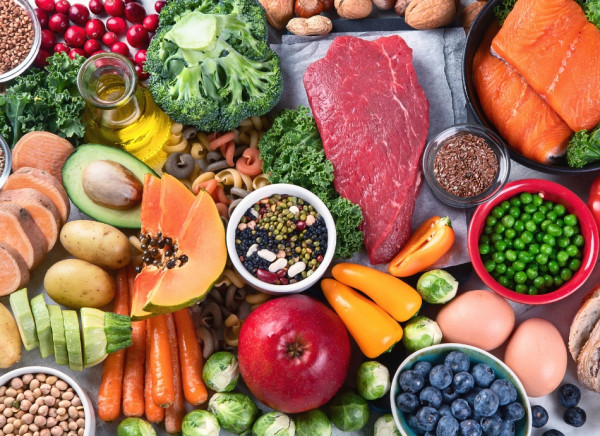You can now add Healthify as a preferred source on Google. Click here to see us when you search Google.
Planning for pregnancy
Key points about planning for pregnancy
- If you’re thinking about having a baby, you probably know quitting smoking and giving up alcohol are 2 really important steps to take to give your baby the best start in life.
- There are many other factors to think about and plan for before you conceive.
- Here are our top tips if you’re planning to start a family.
- These tips are mostly written for someone who’s planning to be pregnant themselves, but they’re good to share with your loved ones too.

Check that you’re eating a balanced diet. That includes 5 servings (that’s the amount that fits in the palm of your hand) of vegetables, 2 servings of fruit, and 2.5 servings of protein (such as meat, beans or eggs) each day. Choose mostly whole foods and less processed foods.

Image credit: Canva
Supplements
If you’re eating a wide variety of foods you shouldn’t need to take additional supplements before and during pregnancy, except folic acid and iodine.
It’s recommended you start taking folic acid supplements at least 4 weeks before pregnancy, and until week 12 of pregnancy. This is to help reduce your chances of having a baby with serious neural tube defects, such as spina bifida. If you’re getting ready to try for a baby, start now! Find out more about the benefits of folic acid during pregnancy including how much to take.
An iodine supplement of 150 micrograms per day prevents thyroid problems for you and your baby, and other growth and brain problems for your baby. If you're vegetarian or vegan start taking them as soon as you start trying for a pregnancy. If you eat meat, you can wait until you're pregnant. Continue throughout pregnancy and breastfeeding.
If you’re iron deficient – especially if you have anaemia, or you're at risk of vitamin D deficiency – a supplement is recommended. Talk to your healthcare provider about this. Read more about vitamin D in pregnancy.
You can buy folic acid, iodine and iron supplements at your pharmacy, or get them on a prescription.
Your baby will need your whare tangata to be strong and healthy for 40 weeks. Aim to exercise 30 minutes most days. Everything that goes into your body goes into your baby’s body too. Keep free of cigarette and cannabis smoke, vaping, other recreational drugs and alcohol. If this is a usual part of your life it can be hard to give up, so give yourself some time by starting now. Read more about vaping and pregnancy(external link) and how to quit smoking.
Your healthcare provider will ask about any medical problems (eg, diabetes) or family history (eg, genetic conditions) that might mean you need special care during pregnancy. They’ll review any medicines or supplements you’re taking to make sure they’re safe in pregnancy – some may need to be changed, such as sodium valproate for epilepsy. They’ll offer pre-pregnancy advice, a folic acid prescription, order a blood test if you need one and answer any questions you have.
Your healthcare provider may check your weight. The reason is that being overweight or underweight can affect your fertility, your health during pregnancy, your safety during delivery and your baby’s health.
This is a good time to get an STI check and cervical cancer screening if it’s due. Some sexually transmitted infections have few or no symptoms and can cause miscarriage or seriously harm growing babies, eg, HIV and syphilis. If these infections are found, they can be managed before you get pregnant so your baby is as healthy as possible.
During pregnancy, it’s important you’re protected against infections and illnesses that can be harmful to you and your baby. Measles, mumps, rubella, chickenpox and pneumococcal infections can cause complications to your unborn baby, so you may need a booster before conceiving. Read more about pregnancy and immunisation.
A lead maternity carer (LMC) is a healthcare provider, usually a midwife or sometimes a GP or an obstetrician (specialist doctor), who will look after you throughout your pregnancy and for the 4 to 6 weeks after your pēpi is born.
It’s a good idea to choose your LMC as soon as you know you’re pregnant, so listen to word-of-mouth or ask for recommendations from friends, whānau or your healthcare provider before you’re pregnant. The New Zealand College of Midwives runs a service called Find your midwife(external link). Learn more about maternity care in Aotearoa New Zealand(external link).
Having children can be expensive. Now is the time to think about how you’ll manage financially with a child, how much parental leave(external link) you can afford to take or what expenses you can cut back on if you need to save money.
If you’re with a partner, it’s a good idea to have a conversation about money and work together to manage your finances.
Becoming pregnant is a team effort! Soon-to-be dads also need to think about the things that may affect their fertility. These include smoking, alcohol or being overweight.

Image credit: Depositphotos
If you’re in a relationship, talk with your partner about your expectations about pregnancy and how they can best support you. It’s also a great time to talk about your hopes and dreams for your baby and your new family. Read more about supporting your partner during pregnancy(external link).
Think about what support you might need in your pregnancy and when caring for a baby.
Here are some the things that are going to be important:
- Your relationships with whānau and friends.
- Where you live.
- Your employer’s policies about parents.
- What transport you have access to.
- Community services.
- The things you need to keep you mentally well.
You don’t have to have this all worked out before you conceive – pregnancy takes a long time!
Pregnancy can make gum disease and cavities more likely. Poor oral health is related to poor pregnancy outcomes(external link), eg, preterm delivery and low birth weight.
When you're ready to start trying for a pregnancy, stop using any contraception. If you're using hormonal contraception which has stopped your periods it can take a few months for your cycle to restart.
If you have sex about every second or third day from the end of your period until about a week before your next period is due, there's about a 9 in 10 (90%) chance you will fall pregnant within 12 months. Sperm live for up to 7 days so there will be some around whenever your egg arrives. You don't need to be exact about timing, getting pregnant is the purpose of your reproductive system.
If you would like to understand more about timing, you can learn about your menstrual cycles and track your periods on an app, many of which will tell you when your fertile time is. If you have cycles longer than 40 days, irregular cycles or polycystic ovarian syndrome discuss this with your healthcare provider.
If you get period pain it's safe to use paracetamol or anti-inflammatories, it won't affect your next cycle.
Getting pregnant can be difficult for some people and as you get older it can get even more difficult.
Under 35 years of age
If you’re under 35 years of age, the time to try for a baby before seeking help is usually 12 months.
35 years of age or over
In general, if you are:
- having regular periods, and
- not using contraception, and
- having sex about every second day of your fertile time of the month (generally the 5 days before you ovulate, the day you ovulate and the day after) try for 6 months.
If you're not pregnant in 6 months visit your healthcare provider. They can advise and refer you to fertility services if needed.
Conditions such as polycystic ovaries and endometriosis can affect fertility, as can undescended testes and abnormal sperm and/or low sperm counts. Find out more about fertility and your biological clock(external link).
The pregnancy tests you buy from the supermarket or pharmacy are very reliable. A positive test is almost certainly correct. A negative test can mean it’s a bit too early, so if you still think you might be pregnant, wait a week and try again if your period still hasn’t come.
Brochure
Planning for pregnancy(external link) RANZCOG, Australia, 2016
Apps
References
- Avoiding nutrient deficiencies in pregnancy Healthify He Puna Waiora, NZ
- Pregnancy and immunisation Healthify He Puna Waiora, NZ
- Pregnancy – over 35 years Healthify He Puna Waiora, NZ
- When to talk to us(external link) Fertility Associates, NZ
- Pre-conception consultation(external link) Auckland Community HealthPathways, NZ, 2023
- Talking to pregnant women about oral health(external link) Centers for Disease Control, US, 2024
- Ovulation calculator(external link) WebMD, US, 2024
Credits: Healthify editorial team. Healthify is brought to you by Health Navigator Charitable Trust.
Reviewed by: Dr Emma Dunning, Clinical Editor and Advisor
Last reviewed:





